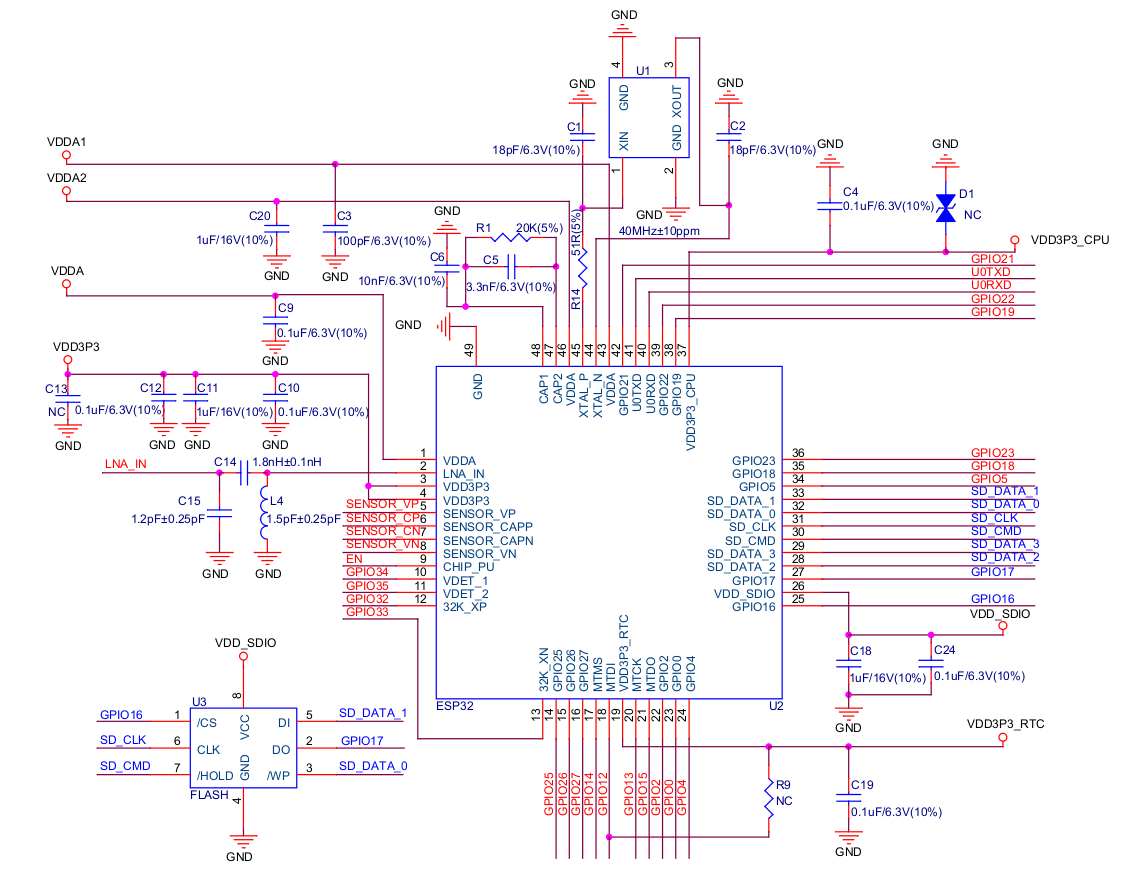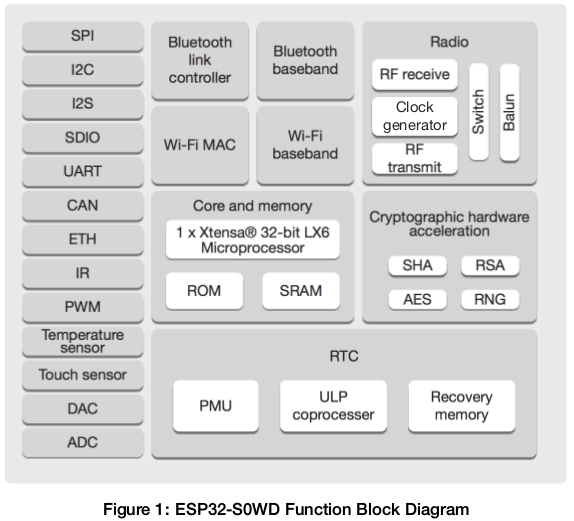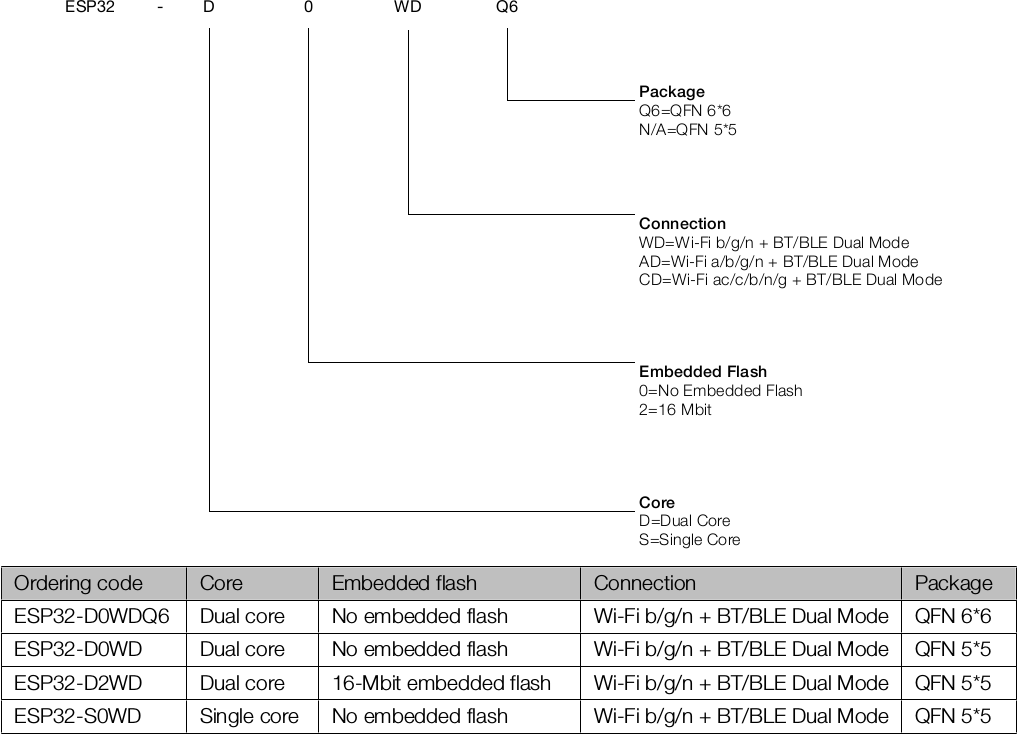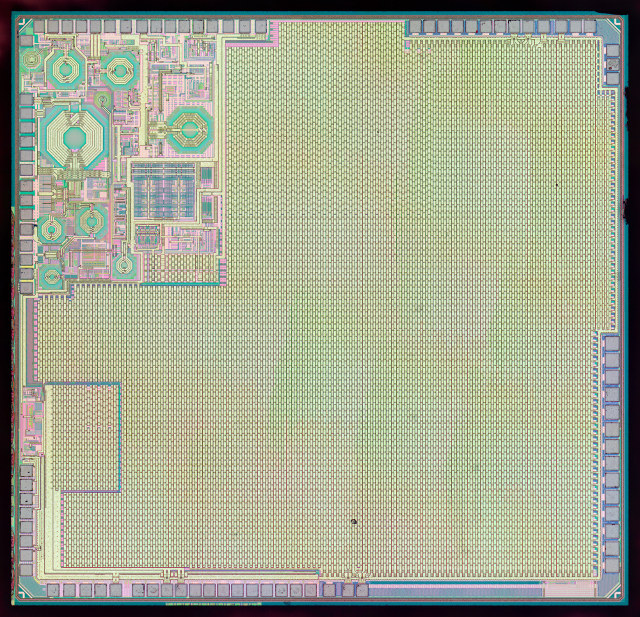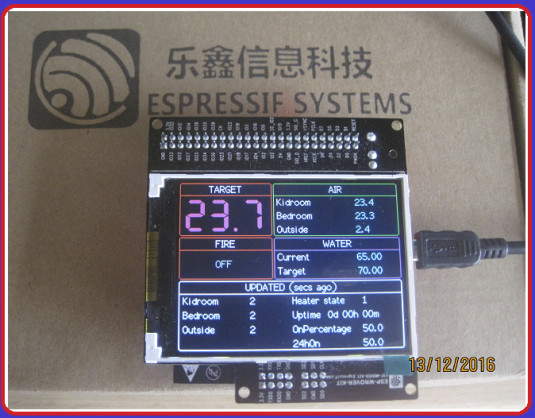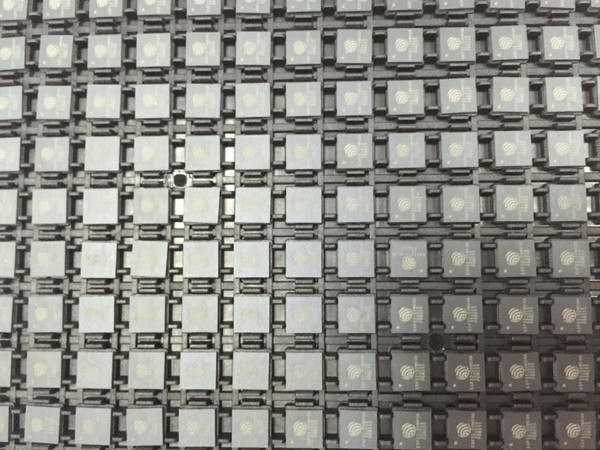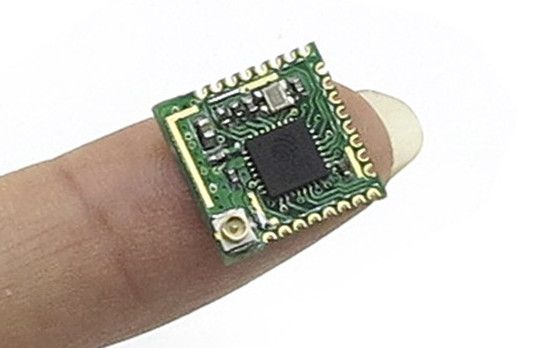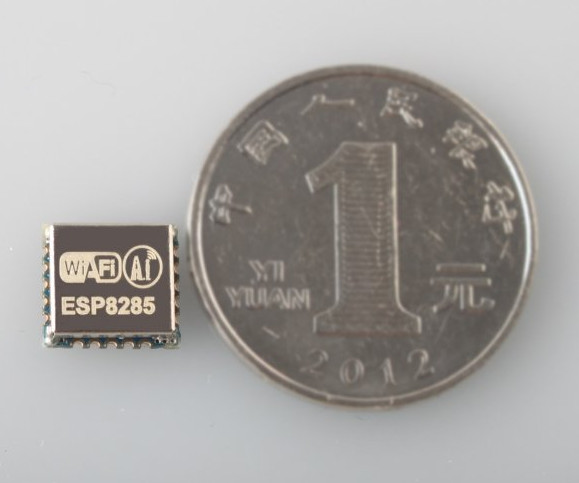Espressif Systems has revealed another ESP32 variant, but this time it’s not an SoC, but a 7x7mm system-in-package (SIP) that comes ESP32 dual core processor, a 4MB SPI flash, a crystal oscillator and various passive components, so that you don’t need to include those in your design, and create an ultra-compact PCB for wearables and other space-constrained applications. ESP32-PICO-D4 SiP specifications: SoC – ESP32 with two Tensilica LX6 cores, 448 KB ROM, 520 KB SRAM (inc. 8KB RTC memory), 1kbit eFuse On-module Flash – 4MB SPI flash Connectivity WiFi – 802.11 b/g/n/e/i (802.11n up to 150 Mbps) Bluetooth – Bluetooth V4.2 BR/EDR and BLE specification; ; class-1, class-2 and class-3 transmitter; Audio: CVSD and SBC SIP Interfaces SD card, UART, SPI, SDIO, LED PWM, Motor PWM, I2S, I2C, IR GPIO, capacitive touch sensor, ADC, DAC, LNA pre-amplifier Sensors – On-chip Hall sensor & temperature sensor Clock – On-module 40 MHz crystal […]
Single Core ESP32-S0WD WiSoC Datasheet and Price
I’m subscribed to Espressif Systems’ notification system so that I received an email each time there’s a documentation update on their website, and this morning they posted ESP32-S0WD Datasheet, the single core version of ESP32 processor, which we reported in our post about ESP32 5×5 packages. Beside the small 5x5mm 48-pin package, and single Xtensa 32-bit LX6 microprocessor, it looks to be the same as the frequently used ESP32-D0WDQ6 with a 6x6mm 48-pin package. The CPU & Memory part of the datasheet reads: ESP32-S0WD: Xtensa single–core 32-bit LX6 microprocessor, up to 200 DMIPS 448 KB ROM 520 KB SRAM 16 KB SRAM in RTC QSPI flash/SRAM, up to 4 x 16 MB Power supply: 2.3V to 3.6V While ESP32 datasheet shows a dual core up to 600 MIPS, so maybe the max frequency is also limited. I could not find any ESP32-S0WD module or board just yet, but GridConnect is […]
New Espressif ESP32 Single and Dual Core Processors in 5x5mm Package, Optional Embedded Flash Coming Soon
Espressif ESP32 was launched last year as a dual core Tensila processor with WiFi and Bluetooth connectivity, relying on external flash for storage, and packaged into a QFN48 6x6mm package. Espressif recently updated ESP32 datasheet, and the guys at ESP32net noticed three new versions of the processor with a QFN48 5x5mm package, one version including 2 MBytes embedded flash, and another version with a single core. The three new versions of ESP32 all come with the same WiFi 802.11b/g/n ad Bluetooth 4.0 LE connectivity and a QFN 5×5: ESP32-D0WD dual core processor without embedded flash ESP32-D2WD dual core processor with 16 Mbit embedded flash ESP32-S0WD single core processor without embedded flash ESP32-D0WD different with ESP32-D0WDQ6 is only the smaller package, while ESP32-D2WD brings 2MB embedded flash too possibly lowering the price of current solution with external flash, and ESP32-S0WD might be closer to ESP8266 price thanks to its single core, […]
Oh Look… Espressif ESP32 Die-shot! That’s Pretty!
Espressif ESP32 was launched last year as a faster and upgraded version of ESP8266, with a dual core processor, 802.11 b/g/n WiFi and Bluetooth 4.0 LE. Boards based on the processor are still priced much higher than the ones based on ESP8266 ( although we’re only talking about $20 here), and shops have trouble keeping stocks, so either there’s a huge demand, there’s some manufacturing bottleneck, or maybe Espressif wants to take it slow at the beginning in case some hard to find bugs are found in the Silicon. Nevertheless, the guys at Zeptobar got hold of some ESP32 modules, and took some pretty die-shots. The die size is 2960×2850 µm. The prettiest part is clearly the RF section zoomed in below. If you wonder how it compares to ESP8266 die-shot, Zeptobar has you covered. Jean-Luc Aufranc (CNXSoft)Jean-Luc started CNX Software in 2010 as a part-time endeavor, before quitting his […]
ESP32-WROVER-KIT Devkit Supports Espressif ESP32 Modules, Includes a 3.2″ LCD Display
Yesterday Olimex wrote a blog post informing us that ESP32-CoreBoard was back in stock, one the many ESP32 boards launched late this year, but still hard to get. The company also mentioned they’d have limited quantity of the new ESP32-WROVER with JTAG and LCD display together with the picture below. ESP32 is quite more powerful than ESP8266 so it makes sense to have an ESP32 development kit with an LCD display. A quick DuckDuckGo search led me to ESP-WROVER-KIT Getting Started Guide, where we can find more details including the overall specifications: Compatible with ESP-WROOM-32 and ESP32-WROVER modules based on ESP32 dual core Tensilica L108 processor clocked at up to 240 MHz with WiFi and Bluetooth LE connectivity Storage – Micro SD slot Display – 3.2″ LCD display connected via SPI USB – 1x micro USB port Expansion 8-pin UART header 6-pin SPI header 48-pin header for I/Os and camera […]
Espressif ESP32 WiFi & Bluetooth SoC is Now Up For Sale for $2.85
Espressif ESP32 is one of the most awaited chip for IoT applications as it combines a dual core processor, WiFi, Bluetooth 4.0, and various I/Os. The good news is that you can now purchase ESP32 for 19 RMB ($2.85) on Taobao, or if you are not based in China, contact Espressif by email at sales [at] espressif.com. Availability is however limited, and the maximum order is now 5 pieces. ESP32 modules and boards, as opposed to just the SoC, are not quite ready right now, but should become available in a few weeks. ESP-WROOM-32 is the ESP32 module developed by Espressif, and NodeMCU is also working on an ESP32 board, so we’ll get more good news very soon. You can also find documentation, hardware and software resources on a Espressif ESP32 page , including a getting started guide, ESP32 SDK, ESP32 reference manual, ESP-WROOM-32 datasheet, and more. If you are […]
PSF-A85 is a $2 ESP8285 WiFi Board for IoT and Wearables
Last month, we found out that Espressif has made a smaller version of ESP8266 targeting wearables called ESP8285, but the only development board available at the time was quite more expensive than usual at about $25. ITEAD has now released an ESP8285 module with some I/Os and an IPEX connector which they sell for just $1.99 + shipping. PSF-A85 specifications: SoC – Espressif ESP8285 Tensila WiFi SoC @ 80/160 MHz with 1MB flash Connectivity WiFi 802.11 b/g/n/d/e/i/k/r with support for STA/AP/STA+AP modes, WPA/WPA2 PSK and WEP security Antenna – IPEX connector (antenna not included) or “stamp hole interface” Expansion – 24-pin with GPIO, PWM, UART up to 460800 bps, SPI, ADC, Power Supply – 3.3 V Dimensions – 13.7 x 13.4 mm More technical information include the schematics (PDF only) and ESP8285 datasheet can be found in the Wiki, which sadly does not contain any software / getting started information, […]
Espressif ESP8285 is just like ESP8266 but with 1MB built-in Flash, and Designed for Wearables
Espressif announced ESP8285 WiFi SoC was entering production last March. The new processor is based on ESP8266, but the company added 1MB built-in flash to make the solution smaller, and more suitable to wearables such as smartwatches and activity trackers. ESP8285 features a Tensilica L106 32-bit MCU and another ultra-low-power 16-bit RISC core, as well as 802.11 b/g/n/d/e/i/k/r WiFi connectivity. AI Thinker has already produced a tiny module based on the solution, called ESP-8285, and another person has developed an ESP8285 development board sold on Tindie for $24.95, and with some code sample (Arduino sketches) on Github. You’ll also find some more technical information on a Devacron blog post, or inside the datasheet on Espressif website. Via Hackaday Jean-Luc Aufranc (CNXSoft)Jean-Luc started CNX Software in 2010 as a part-time endeavor, before quitting his job as a software engineering manager, and starting to write daily news, and reviews full time later […]


